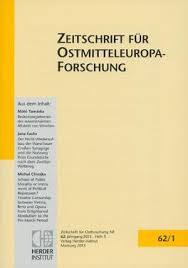Für eine gemeinsame deutsch-polnische Zukunft? Hans Hartwig von Beseler als Generalgouverneur in Polen 1915-1918
A shared German-Polish Future? Hans Hartwig von Beseler as Governor-General in Poland 1915-1918
Author(s): Robert SpätSubject(s): Diplomatic history, Military history, Political history, Pre-WW I & WW I (1900 -1919)
Published by: Verlag Herder-Institut
Keywords: German-Polish Future; Hans Hartwig von Beseler; Governor-General in Poland; 1915-1918;
Summary/Abstract: During the First World War, Hans Hartwig von Beseler, as Governor-General in Warsaw, was the central figure in German planning for the future organisation of occupied Poland. The following paper will examine his influence on the formulation and implementation of German policy in Poland. Source material includes, along with the official documents of the German occupation, an analysis of Beseler’s private correspondence and diaries. The biographical elements make it possible to investigate Beseler’s personal views on German policy in Poland, to trace his political aims, and also to examine the extent and limitations of his political actions. His objective was to bring together the security needs of the German Empire towards Russia with Polish desires for the reestablishment of a Polish state. Thus he forcefully advocated the proclamation of the Kingdom of Poland and promoted the formation of a Polish army, which, at one and the same time, was to strengthen the Central Powers militarily and act as the foundation of the new Polish state. To support his arguments for a closer relationship between Poland and the German Empire, Beseler emphasised shared cultural values as well as the political, economic and military advantages for both states. De facto, a ‘closer relationship’ would have meant German control over Poland. Beseler’s position stemmed from his paternalistic rule as Governor-General, which consisted in governing the Poles, without transferring any significant responsibilities to them. He was, nevertheless, concerned to establish friendly relations between Germans and Poles and to proceed with the gradual internal development of a Polish state. In this he enjoyed a wide-ranging freedom of action and was able, to a large extent, to gain acceptance of his aims by the German government and the supreme military authorities. However, with the failure of the formation of a Polish army in the summer of 1917, Beseler increasingly lost influence as an advocate of GermanPolish co-operation and was no longer able to play any significant role in decision-making processes affecting the future of Poland.
Journal: Zeitschrift für Ostmitteleuropa-Forschung
- Issue Year: 58/2009
- Issue No: 4
- Page Range: 469-500
- Page Count: 32
- Language: German

